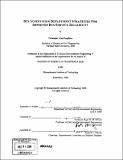Bus supervision deployment strategies for improved bus service reliability
Author(s)
Pangilinan, Christopher Allan
DownloadFull printable version (37.16Mb)
Other Contributors
Massachusetts Institute of Technology. Dept. of Civil and Environmental Engineering.
Advisor
Nigel H.M. Wilson.
Terms of use
Metadata
Show full item recordAbstract
Bus service reliability has always been a top concern for transit agencies and their customers. Unfortunately, there are several factors detrimental to reliable bus service. Outside influences such as weather, traffic, and road construction can wreak havoc on even the best laid plans. Internally, poor planning, insufficient maintenance, and differing operator abilities can work to undermine bus service reliability. To help counteract these problems, transit agencies typically deploy a team of supervisors who are responsible for monitoring, maintaining, and restoring reliable service. To do their job effectively, supervisors require high levels of operational information and a reliable communications system. These resources, however, can vary in their availability and may not be at ideal levels. This research proposes a framework to aid in the planning of bus supervision deployment given different levels of information, communications, and personnel. The primary focus of the framework is the deployment of post, mobile, and control center supervisors given an agency's current level of information and communication resources. The application of the framework begins with a service reliability and supervision resource assessment. (cont.) Based on these assessments, a system level personnel deployment strategy is developed and then evaluated. Two case studies - the Chicago Transit Authority (CTA) Route 20 and the Massachusetts Bay Transportation Authority (MBTA) Silver Line - are presented as applications of the proposed framework. Findings suggest that personnel deployment at both agencies is suboptimal: both agencies deploy too many post supervisors given current resource levels, and for the CTA, too few mobile supervisors. Findings also suggest that putting increased information and communication resources in place should lead agencies to have post supervisors only at the busiest most critical locations, mobile supervisors for incident response and reallocate many field-based supervisors to the control center for headway and schedule management.
Description
Thesis (S.M.)--Massachusetts Institute of Technology, Dept. of Civil and Environmental Engineering, 2006. Includes bibliographical references (p. 145-146).
Date issued
2006Department
Massachusetts Institute of Technology. Department of Civil and Environmental EngineeringPublisher
Massachusetts Institute of Technology
Keywords
Civil and Environmental Engineering.